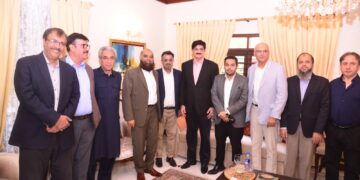Introduction: Karachi – the largest city located on the coast of Pakistan – is experiencing one of the worst heatwaves of recent years at the moment. Apart from the given meteorological data and statistics, this article will try to explain how this phenomenon affects the residents of Karachi, their challenges, their strengths that should be appreciated, and the necessity to act together.
Voices from Karachi: When the sun is out and temperatures are high, the streets of the city are alive with tales of suffering and survival. For the Ahmed family, who reside in a relatively small house with no access to air conditioning, it has resulted in sleepless nights and constant concern for their elderly members. ”We do our best to drink water and avoid the heat, but it is difficult,” said Mrs. Ahmed, who was sweating.
Health Challenges and Losses: The impact of the heatwave on public health has been great, with the hospitals admitting cases of heatstroke due to the high temperatures. Unfortunately, three people died from heatstroke last Sunday alone. Moreover, Dr. Khan from Abbasi Shaheed Hospital shared the difficulties of medical personnel in handling masses during such adverse weather conditions. On this, he says, “High temperatures and humidity cause heat-related illnesses, and when the two are combined, it becomes worse.”
Impact on Daily Life: Besides the health impacts, the heatwave has affected the day-to-day activities of people in the city. Open areas, where normally there is traffic most of the time, experience decreased traffic as people opt to stay indoors. Small businesses such as Ali, a street vendor who sells cold drinks by the street side have been heavily impacted since fewer people go out during the heat.
Climate Change and Urban Challenges: There are some scholars who have attributed the intensification of heatwaves in Karachi to climatic change. Thus, Dr. Fatima, an environmental scientist, argues that sustainable urban planning and green infrastructure are critical in preventing future disasters. The heatwaves in Karachi are a sign for policymakers to pay attention to climate vulnerability.




















